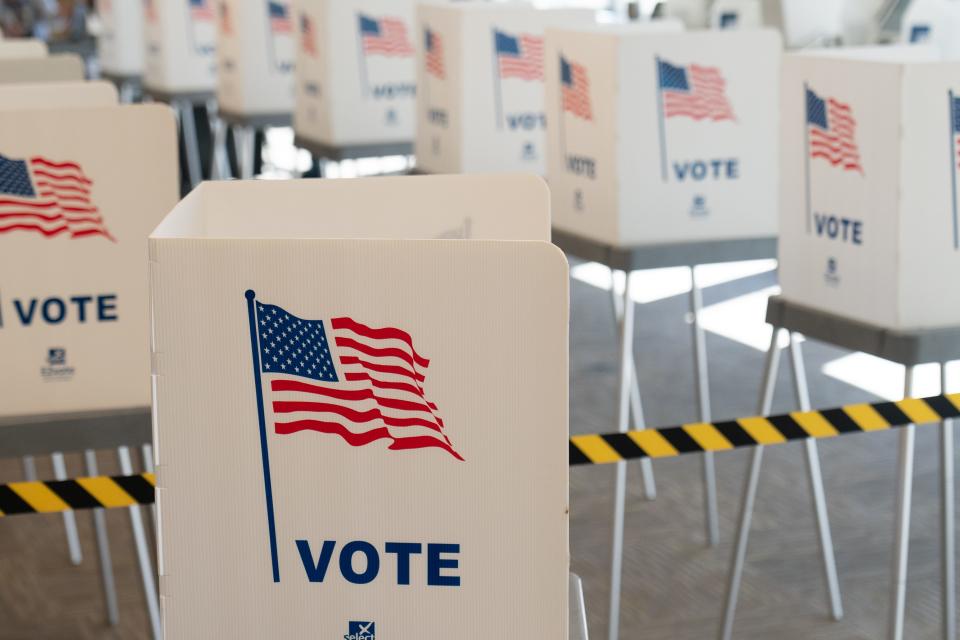Kansas voters will have a busy election year in 2024. Here's what to know
Kansas will have a busy election year in 2024 as voters take to the polls or fill out mail ballots.
Several races will be on the ballot, including the four representatives in Congress and all 165 members of the Kansas Legislature. But the first election will be the presidential preference primary.
Here's information from the Kansas Secretary of State's Office about what to know before voting in the 2024 elections.

When is the 2024 presidential primary in Kansas?
The 2024 presidential election picks up in earnest in January, when Republicans hold the Iowa caucus on Jan. 15 and both Republicans and Democrats hold Jan. 23 primaries in New Hampshire. Kansas isn't until after Super Tuesday, the March 5 primaries in several states, including California and Texas.
The Kansas 2024 presidential preference primary election is March 19.
The Kansas deadline to register to vote or to update your voter registration is Feb. 20. That is also the last day to apply for an advance voting mail ballot. Advance voting starts Feb. 28 both in-person and by mail. In-person advance voting ends March 18 at noon. Mail ballots must arrive by the close of polls on March 19.
When is the 2024 primary election in Kansas?
The Kansas 2024 primary election is Aug. 6.
The deadline to change your party affiliation is noon June 3. The voter registration deadline is July 16.
Advance voting begins July 17. In-person advance voting lasts until noon Aug. 5. Mail ballots can be requested until July 30, and they must be postmarked by Election Day and received by Aug. 9.
When is the 2024 general election in Kansas?
The 2024 general election is Nov. 5.
The deadline to register to vote or to update your registration is Oct. 15.
Advance voting begins Oct. 16, with in-person voting lasting through noon Nov. 4. Vote by mail has an Oct. 29 deadline to request a ballot, with a due date of Election Day to be postmarked and it must arrive by Nov. 8 to be counted.
How to register to vote in Kansas
You can register to vote online as long as you have a valid Kansas driver's license or identification card. If not, you have to register using a paper application.
The application asks for name, gender, address, birthday and other basic information.
Your party affiliation can be Republican, Democratic, Libertarian or unaffiliated, which is also known as independent.
You can check and confirm your registration information, including polling place locations, online at myvoteinfo.voteks.org.
Voter qualifications in Kansas
To register to vote in Kansas, you must be a U.S. citizen and a Kansas resident and will be age 18 or older before the next election.
If you have a former residence or name, you must have abandoned it.
For convicted felons, you must have received your final discharge from imprisonment, parole or conditional release.
Kansas has early voting options
Kansas law allows early voting in two ways.
Advance voting in person can be done at county election offices or satellite locations up to 20 days before an election, but days may vary. Local election offices set the exact dates and locations for their counties.
Advance voting by mail is legal under Kansas law, but voters first must request a ballot by completing an application and including a copy of their ID. Ballots must be postmarked on or before Election Day and received by close of business on the third business day after the election, except for the presidential preference primary, for which mail ballots must arrive by when polls close on Election Day.
Kansas voter ID requirements
Under state law, voters must show a photo ID when voting in-person. A state driver's license or ID card works, as do U.S. passports and military ID, Native American ID cards, student ID cards and other documents.
The photo ID requirement is exempted for permanent advance voters due to illness or disability, military and overseas voters and voters with a religious objection to photo ID.
Jason Alatidd is a statehouse reporter for the Topeka Capital-Journal. He can be reached by email at jalatidd@gannett.com. Follow him on X @Jason_Alatidd.
This article originally appeared on Topeka Capital-Journal: What to know about Kansas 2024 election dates, how to register to vote

